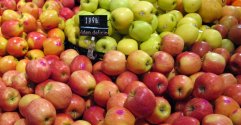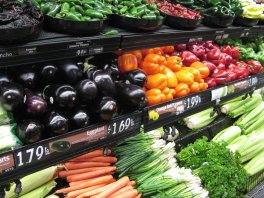|
Deciding To Become VegetarianHow difficult is it to become vegetarian? Actually it's quite easy...much easier than you might think! Would you like to find out how you can become vegetarian...instantly? Here's the super-secret scoop. You probably already are vegetarian. We've never met anyone who isn't vegetarian. Everybody eats plant-based foods. For some folks, this may be nothing more than white bread, french fries and ketchup. Now that's not a very nutritious diet and we're not recommending it. But that is a type of vegetarian diet. Everyone who consumes plant-based foods is, to some extent, vegetarian. At first, deciding to become vegetarian is as much a mental challenge as it is anything else. Eating meat products is a common practice the world over...but so is being a practicing vegetarian. And there are good reasons to consider going meatless and we'll touch on
the benefits of a vegetarian diet
It's much easier to decide to become vegetarian when you realize that you're already over half way there. Going meatless can simply mean choosing not to consume some or any of the animal products that you used to eat. It doesn't need to be any more complicated than that, even though at first it can seem to be a giant leap for many of us. What's important is to realize that it's not at all unnatural to become vegetarian. Years ago, some raw food advocates we met used to make their case for a raw food diet by proclaiming "You weren't born with a cookstove attached". In making this statement they were trying to stress the importance of determining what exactly are "natural foods" for humans. The conclusion they reached was that cooked food is not natural and only raw foods were optimally healthy for humans. We think the proper proclamation should be "You weren't born with an owner's manual attached". In making this statement we are stressing the importance of relying on our own sensibilities and innate intelligence to determine, for ourselves, what is a "natural food" for us. For example, let's consider tree fruits. The next time you visit the grocery store (or an orchard) does the sight and/or smell of an apple or a peach make you want to grab it and take a bite? Obviously, the answer is "yes". Now stroll on over to the meat counter and look at the steaks. 
Are you drooling yet? If you are, it's because you're anticipating the fun you'll have tossing that baby on a hot grill, broiling it to perfection and then serving it sizzling with your favorite steak sauce. Does that reaction mean that steaks are a "natural food" for humans? No, it does not. If raw meat were a natural food selection for us then our innate intelligence would have kicked in back at the grocery store. Instead of waiting to cook our "natural selection" our inclination would have been to take a bite out of that ribeye steak right there on the spot. Only if you had already developed an acquired taste for steak tartar would you ever consider doing that. The purely natural reaction for most people to the sight and smell of raw meat of any kind is revulsion. Only by artificially altering raw meat into something else does it become palatable. Here's another example...raw oysters. It is our opinion that eating raw oysters is an acquired taste. An oyster in the shell does not look very appetizing and you can't eat them right out of your hands. You need special tools to shuck them efficiently and, even then, they're hardly appetizing. What about raw eggs? How about milk...maybe. So what does all of this mean? For now this exercise gets us off to a good start. But does that mean that we should only eat fresh produce? What about breads, grains and everything else? Obviously there's much more to consider here and we'll go into greater detail as we discuss the different food groups and the Tell us about your decision to go meatless.Did you have a light bulb go off in your mind one day? Did you have to wrestle with the idea of going meatless or did it just fall into place for you all by itself? What Other Visitors Have SaidClick below to see contributions from other visitors to this page...
Insights From India Not rated yet
Young bachelor learns to cook Not rated yet Return to Meatless Living from Deciding to Become Vegetarian
|
 a bit later.
a bit later. Our own natural reactions can give us immediate and direct confirmation about what is natural for us to eat. It gives us a solid base to work from...that to become vegetarian is a completely natural choice for us and there is no reason to feel intimidated about experimenting with a meatless diet.
Our own natural reactions can give us immediate and direct confirmation about what is natural for us to eat. It gives us a solid base to work from...that to become vegetarian is a completely natural choice for us and there is no reason to feel intimidated about experimenting with a meatless diet.
